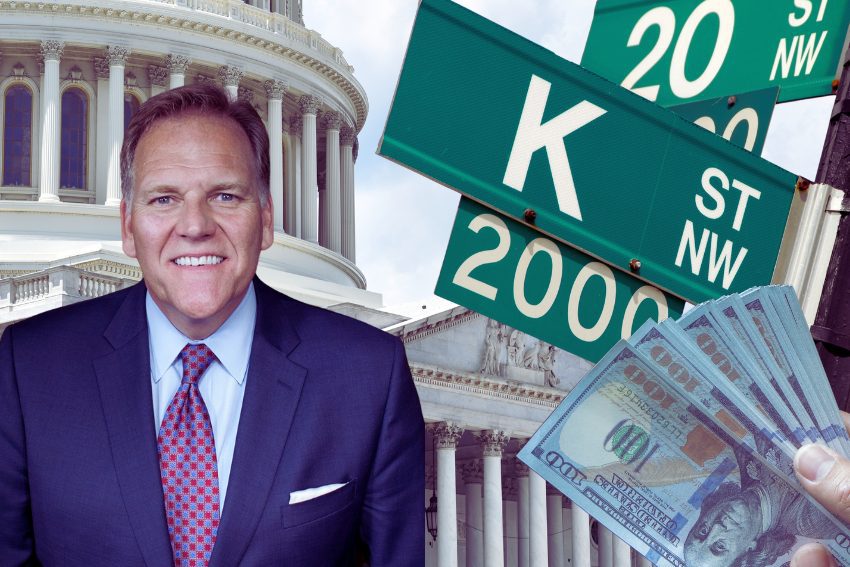
Cash is king in politics—and it’s a trend Republican lawmaker Mike Rogers did little (if anything) to stop during his 14 years as a member of US Congress.
MICHIGAN—Michiganders are less than six months away from what’s expected to mark the most expensive election in American history, with some groups anticipating that more than $10 billion will be spent on political ads by the time polls close in this year’s presidential election.
And in what’s shaping up to be one of this year’s more competitive races, voting records show one Republican US Senate candidate from Michigan has done little (if anything) to curb the outsized role that cash—and corporate influence—plays in deciding federal policy.
His name is Mike Rogers.
Rogers served 14 years in Congress before announcing his retirement in 2014, and a review of his record from his time in the House of Representatives shows that Rogers consorted with lobbyists and repeatedly stood in the way of campaign finance reforms that were designed to minimize corporate influence in politics and bring more transparency to political spending.
Rogers is viewed as the frontrunner in the Republican primary election and is expected to face off against Democratic US Rep. Elissa Slotkin in the November general election to decide who will replace soon-to-retire Democratic US Sen. Debbie Stabenow.
Rogers on the Record
A review of Rogers’ stance on several key pieces of legislation during his time in Congress, helps to shed some light on how he might vote in the future, if he’s elected in November.
In 2002, Rogers voted against the Bipartisan Campaign Reform Act, otherwise known as the McCain-Feingold Act, which regulated political spending and required candidates to “stand by” their advertisements—namely by throwing a tagline with their name at the end of commercials.
Among other things, that legislation prohibited unlimited amounts of so-called “soft money” from being donated to national political parties and also limited campaign financing only to “hard money”—which are donations that are made directly to a candidate’s political campaign.
When asked about why he opposed the legislation ahead of the vote, Rogers, at the time, explained to one reporter: “It’s like the old saying about a prostitute. You’ll do it for a million or you’ll do it for a dollar—it still makes you a prostitute. It’s the same way with corruption.”
The legislation passed into law without Rogers’ support, and was billed as the most significant campaign finance law to be passed by federal lawmakers since at least 1974. But eight years later, the US Supreme Court’s ruling in Citizens United v. Federal Election Commission essentially reopened the floodgates for huge amounts of money to be spent on campaigns through unlimited corporate and other special interest political donations.
In 2006, Rogers voted against a House Resolution that sought to ban lawmakers from accepting gifts from lobbyists, including travel expenses. It also sought to close (or at least slow down) the so-called “revolving door” of ex-lawmakers retiring from Congress to pursue often-lucrative careers as lobbyists by extending the lobbying ban on former legislators from one to two years.
Later that summer, Rogers was reportedly spotted on the bow of a luxury yacht alongside lobbyists with the National Marine Manufacturers Association. The event—dubbed the “Congressional Cruise Series”—was billed, unabashedly, as a way for lobbyists to develop relationships with influential politicians, according to reports from the Chicago Tribune.
A few years later, in 2010, Rogers voted against the DISCLOSE Act, which would’ve required groups who spend money on elections to disclose their largest donors—namely to help lift the veil on so-called “dark money” groups that hide their donors while trying to influence voters.
That bill also included a requirement for campaigns to report their political expenditures within 24 hours—particularly for political expenditures of $10,000 or more that are made prior to 20 days before an election, and for expenditures of $1,000 or more within 20 days of an election.
The legislation was designed to provide voters with more timely details ahead of Election Day about who (or what) is funding campaigns and trying to influence their vote. The bill ended up failing by one vote in the face of a Senate Republican filibuster.
In 2011, Rogers voted against another piece of legislation that would’ve required presidential campaigns to disclose any contributions from foreign individuals, corporations, or countries—as well as any donor who spends more than $100,000 during the presidential election cycle.
That legislation passed the US House, but ultimately never made it through the Senate.
And in 2014, Rogers voted for legislation that would have effectively blocked the IRS from issuing proposed regulations designed to require more transparency in political spending.
At the time, advocacy groups said the legislation only helped preserve a tax loophole created through Citizens United that allows corporations, associations, and the super rich to conceal multi-million dollar investments through the guise of so-called “social welfare” organizations.
That legislation passed the House but failed to advance in the Senate.
Rogers’ campaign declined to answer questions or facilitate an interview for this coverage. Instead, Chris Gustafson, a spokesman for his campaign, emailed this reporter a two-sentence statement attacking Slotkin and claiming that The ‘Gander is “fake news.”
“Mike Rogers correctly predicted the influence that corporate dollars would have as a result of McCain-Feingold, while Elissa Slotkin continues to lie to voters about the corporate contributions that are funding her campaign. On the topic, The Gander is a fake news website and a quintessential example of why America needs actual campaign finance reforms,” he said.
‘A Threat to Democracy’
On the other side of the aisle, Slotkin has billed herself as a champion for government transparency and accountability—including by co-sponsoring House Resolution 1118, yet another iteration of the DISCLOSE Act, which includes measures that Rogers has opposed.
Slotkin’s bill, like its predecessors, aimed to expand a federal ban on campaign spending by foreign nationals, as well as require disclosure of campaign expenditures for corporations, labor groups, and other organizations—including revealing their top donors. The legislation was referred to a committee, where it (again) failed to advance under Republican leadership.
“For too long, our government has been working for big business and the wealthy instead of prioritizing Michigan’s families,” Slotkin said in a statement released earlier this year. “Voters deserve to know that their elected leaders are working on their behalf, not looking out for our own financial interests. Cleaning up DC will continue to be a top priority for me in the Senate.”
Slotkin also co-sponsored federal legislation in 2021 and 2022 that was designed specifically to prevent foreign influence in US elections, including by preventing foreign interests and governments from buying advertisements for the purpose of influencing federal elections.
It also tried to mandate more transparency for political donations and spending across the board—namely by requiring all businesses and corporations that spend more than $10,000 per election cycle to disclose their biggest donors, as well as their largest campaign payments.
“I’ve had Michiganders—Democratic and Republican-leaning alike, young and old—tell me that they have lost faith in our democracy, that ‘both sides are corrupt,’ and that they’re giving up on even voting,” Slotkin said in a statement as the bill was introduced. “It’s not only heartbreaking to hear that as an American, but as a national security professional, I believe it’s a threat to our democracy if Americans no longer feel like their voices can be heard in our democratic system.”
The legislation also sought to start a small (and voluntary) public financing system for congressional elections, along with launching a new funding mechanism supported by corporate fines. Slotkin and other lawmakers dubbed it the “Freedom From Influence” fund.
“No matter your party, we can all agree: we’ve got to strengthen our democratic process and restore public confidence in our elections,” Slotkin said in a statement. “The bill calls for a number of steps to make elections more secure, more transparent, and more accountable.”
The legislation passed the House, but Senate Republicans blocked it from advancing into law.
End Citizens United, a group dedicated to reversing the US Supreme Court decision in Citizens United, picked Slotkin for its first Senate endorsement this year—largely because she has pledged not to accept corporate cash from political action committees this election cycle.
“Elissa knows that what’s holding up progress is a system that too often serves the wealthy and well-connected instead of regular people,” End Citizens United President Tiffany Muller said in a statement. “From day one, she has led the fight to change that. She’s never taken a dime of corporate PAC money, is working to ban corporate PACs, and ban members of Congress from trading stocks, and has stood up to make our democracy stronger and more transparent.”
Muller added: “Not only will Elissa Slotkin be an exceptional leader to represent Michigan families in the US Senate, but she’s also demonstrated over and over again her commitment to getting corporate money out of politics and making Washington more accountable to voters.”
What’s next?
Both Slotkin and Rogers have opponents in the primary election, but they also have advantages that make a November showdown likely, reports the Associated Press.
Television actor Hill Harper and businessman Nasser Beydoun are challenging Slotkin for the Democratic nomination. Former US Rep. Justin Amash, businessman Sandy Pensler, and physician Sherry O’Donnell are running against Rogers on the Republican ballot.
Michigan’s primary election is on Aug. 6. The general election is Nov. 5.
READ MORE: Rogers tries to distance Senate campaign from his anti-abortion record
For the latest Michigan news, follow The ‘Gander on Twitter.
Follow Political Correspondent Kyle Kaminski here.
Support Our Cause
Thank you for taking the time to read our work. Before you go, we hope you'll consider supporting our values-driven journalism, which has always strived to make clear what's really at stake for Michiganders and our future.
Since day one, our goal here at The 'Gander has always been to empower people across the state with fact-based news and information. We believe that when people are armed with knowledge about what's happening in their local, state, and federal governments—including who is working on their behalf and who is actively trying to block efforts aimed at improving the daily lives of Michigan families—they will be inspired to become civically engaged.


Another former Republican Michigan Congressman is abandoning Donald Trump
Former US Rep. Fred Upton, a Republican who represented Southwest Michigan’s 6th Congressional District, is throwing his support behind Kamala...

Fact Focus: Inactive voters on Michigan’s rolls are misrepresented in suggestions of fraud
Less than two weeks from Election Day, posts circulating on social media claim that Michigan has 500,000 more registered voters than it has people...

Court decisions in Michigan and North Carolina deny GOP challenges to overseas voters
Courts in Michigan and North Carolina on Monday rejected attempts by Republicans to disqualify the ballots of certain overseas voters. Both cases...

Liz Cheney teams up with Kamala Harris to warn Michiganders against second Trump term
Former Republican Congresswoman Liz Cheney is putting her “country over party” and urging Michiganders to vote for Democratic presidential candidate...

5 things to know about conservative Michigan Supreme Court candidate Andrew Fink
Voters will decide in November who gets to serve on the most powerful court in Michigan. And Republican state Rep. Andrew Fink thinks he deserves a...





